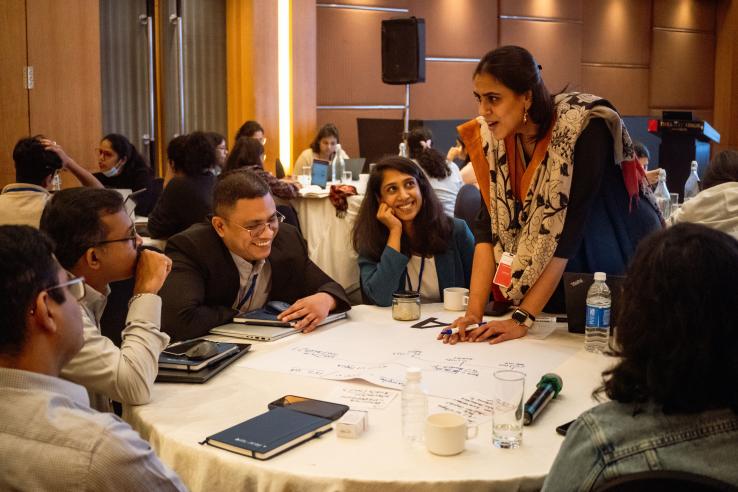CLEAR/J-PAL South Asia – Make Measurement Matter: Designing Surveys for Better Evidence (2026)
Partners:

Collecting accurate and meaningful data lies at the heart of effective program design, implementation, and policymaking. Make Measurement Matter: Designing Surveys For Better Evidence (MMM2026) is a three-day, in-person course to equip development professionals with the theoretical knowledge and practical tools to design robust surveys to drive data-use and evidence-based decisions. Applications close on January 6, 2026.
The application deadline has been extended, with applications now closing on 11 January 2026 (11:59 PM IST).
About the Course
MMM2026 marks an evolution of J-PAL South Asia’s long-running Measurement and Survey Design Course (MSDC).
While MSDC focused on introducing foundational measurement theory and quantitative survey design, emphasizing abstract concepts, SMART indicators, piloting protocols, and field management basics, MMM 2026 offers a broader and more applied orientation, expanding the scope to focus more directly on how organizations can use data and evidence to strengthen real-world program decisions.
While the core strengths of MSDC remain - rigorous measurement concepts, systematic survey design, and J-PAL’s field-based expertise - the 2026 chapter places greater emphasis on practical applicability, decision relevance, and integrating measurement into day-to-day program cycles, making it a distinct new edition within the same learning tradition.
Course Focus
The course blends conceptual clarity with practical exposure across the entire data lifecycle, featuring essential concepts in measurement theory and quantitative survey design strategies.
MMM2026 incorporates brand new modules on data use, visualization, impact communication, and practical field trade-offs, alongside hands-on “think-through” exercises that help participants design tools grounded in their operational contexts, training participants in designing surveys that directly improve evidence use and decision-making within organizations.
Participants will learn to:
- Identify when and why to collect data for program design and evaluation
- Develop robust theories of change and select SMART indicators
- Design accurate and reliable survey instruments
- Ensure measurement quality and minimize bias
- Pilot, digitize, and manage survey tools effectively
- Analyze, synthesize, and communicate findings for decision-making
- Navigate field challenges and balance rigor with feasibility
- Build internal capacity for evidence use and knowledge transfer within organizations
View the tentative agenda of MMM2026 for more information on the course structure. Please note that the agenda is subject to change.
Who Should Attend
The course is designed for professionals involved in data collection, analysis, and use—whether for implementation, research, or evaluation. It will be especially relevant for:
- Practitioners from implementing organizations and NGOs
- Monitoring & Evaluation (M&E) professionals and researchers
- Donor organizations, philanthropic foundations, and multilaterals supporting evidence-based programs
- Students and early- to mid-career professionals seeking to strengthen quantitative and field research skills
Informational Webinar + Q&A Session
CLEAR/J-PAL South Asia is hosting a virtual Informational Webinar and Q&A Session on 12 December, 2025, between 04:00pm - 06:00pm IST.
Through this session, participants can learn more about
- Course content and structure
- Suitability and selection criteria for applicants
- Application process and deadlines.
Interested applicants will have an opportunity to ask questions directly to the course team before they submit applications.
Important Dates
Please note some important dates to apply and register for MMM2026:
| Description | Date |
|---|---|
| Applications Open | 23 November, 2025 |
| Informational Webinar / Q&A Session | 12 December, 2025 |
| Early Bird Applications Close* | 14 December, 2025 |
| Application Deadline | 11 January, 2026 |
| Course Payments Deadline | 19 January, 2026 |
| MMM 2026 | 17 - 19 February, 2026 |
*To avail the early bird discount of 10 percent, please apply and complete the payment accordingly.
Fee Structure
The fee structure for MMM2026 is as follows:
| Organization Type | Course Fee (IN INR) | |||
|---|---|---|---|---|
| High Income Country | Upper Middle Income Country | Lower Middle Income Country | Low Income Country | |
| Foundations/Donor Organizations | 82,000 | 75,000 | 65,000 | 54,000 |
| For-profit / Multilateral Organization / Consulting Organization | 75,000 | 65,000 | 54,000 | 43,000 |
| Academic/Research institutions | 48,000 | 45,000 | 42,000 | 36,000 |
| Government organizations | 48,000 | 44,000 | 38,000 | 29,000 |
| Graduate Student/ PhD | 48,000 | 44,000 | 38,000 | 29,000 |
| Non-Government Organization | 48,000 | 44,000 | 38,000 | 29,000 |
Notes:
- *Country categories are defined by the World Bank Income Group classification. Participants must identify their category based on where their organization’s headquarters are located. For staff based outside of their organization’s headquarter location, we will consider their base location, as mentioned on their company profile or declared by their Finance department.
- To avail the early bird discount of 10%, apply before 14, December, 2025.
- Cancellation Policy:
- Before 18 January 2026: No penalty
- After 18 January 2026: Full course fees will be charged
For further information or assistance, please contact Bhakti Bhowmik ([email protected]).
